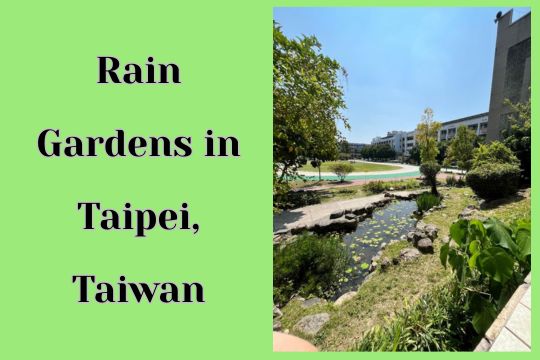Contributed by: Christopher C. Obropta, Ph.D., Extension Specialist in Water Resources
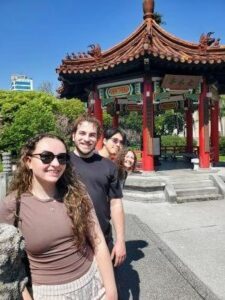
Welcome to Taipei, Taiwan! Gillian Mulvoy, Benny Roe, Erik Lin, Alena Brayshaw
I’ve been transported from my bar stool at the Riverside Inn in Neshanic Station, New Jersey to a window seat on a high-speed train travelling from Taipei to Zuoying, Taiwan. No, its not a Walter Mitty experience; it is really happening. The train, often called a bullet train, travels at 300 km/hr or 180 mi/hr. The trip is 354 kilometers or 215 miles, about the same distance from New York City to Washington, D.C.,
but instead of 4.5 hours on Amtrack, the high-speed rail in Taiwan only takes 90 minutes and only costs $90 roundtrip. I am with four of my staff from Rutgers and six graduate students from Taipei University of Technology. A young woman just rolled down the aisle of the train with a snack cart like on the Hogwarts Express. It’s warm in Taiwan (84°F) as the end of March approaches.
The countryside is littered with rice patties and other farm operations. There is a lot of industrial type buildings and multi-family homes. I have yet to see any single-family homes, but I am told there are subdivisions of single family homes outside the cities, but they are not sprawled across the countryside like in New Jersey. Most of the Taiwanese people live in apartments in the cities. They all own scooters which they call motorcycles. The country runs on fossil fuels (i.e., mostly coal).
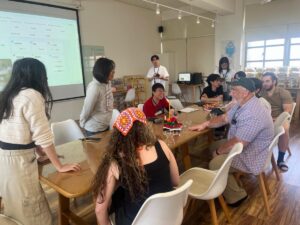
The RCE Water Resources Program met with the teachers at Dazhi Elementary School.
There isn’t enough land for solar, and they are just starting to install windmills along the shoreline and in the ocean. Every building has one or more cisterns (which they call rain barrels) on the roof to help balance water pressure and to store water during the dry season. As the train passes over streams, they all seem to have concrete or earthen levees. I guess this is to help prevent flooding during typhoon season when a single storm can drop several feet of rain.
Our trip to Taiwan is to share our knowledge on rain gardens with the Taiwanese and to gain knowledge from them. I was here in 2019 right after they installed their first two rain gardens in the country. Taiwan EPA was very proud to show these projects to us in 2019. It is 2025, and they now have 16 rain gardens installed across the country. Most of them are at schools or city parks and are coupled with permeable pavement, either grass pavers or pervious concrete. The pervious concrete works well here because there is no ice, so they have no need to use salt that tends to destroy the pervious concrete. Each rain garden has an underground storage tank with a water depth monitor and a pump. The pump transfers water to an irrigation system or back into the rain garden. Each rain garden contains an underdrain that discharges to the
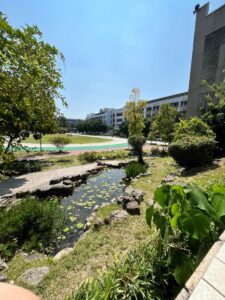
Rain garden and pond at Dazhi Elementary School
storage tank. Each rain garden is equipped with a hand pump so the student can better understand how water gets pumped from the ground, and the students enjoy operating the hand pump. The tanks are regularly tested for dissolved oxygen, conductivity, salinity, biochemical oxygen demand, suspended solids, and E. coli. E. coli has been very high, and they are doing some further investigation into the source of E. coli. Since Taiwan gets very hot, they are concerned about increases in temperature due to climate change. They monitor the air temperature in the rain garden and in the impervious pavement near the garden. The garden is often 2-4°C cooler than the pavement. All the rain gardens seem to be very well maintained. The last garden we saw was at a school that recently had its 90th birthday. They planted colorful petunias in the center of the rain garden in the shape of a “90.”
The remainder of the rain garden was mostly grass. As we were leaving the school, the janitor was hooking up the sprinkler to water the rain garden or maybe just the “90.” Avoiding the need to water is why we use native plants that have a much more substantial root system than these annuals planted in the shape of a “90.” But I understand the school’s desire to celebrate their 90th birthday with petunias in the rain garden.
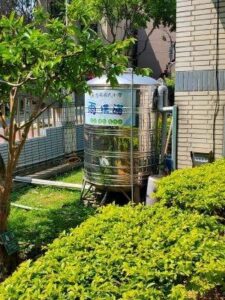
Every school in Taiwan has a rainwater harvesting system to water plants during the dry season.
Every school has a rainwater harvesting system. They do not use a plastic tank but more steel and aluminum. The last school we were at also collected the wash water from the sinks to reuse to flush toilets in the school. Water is scarce in Taiwan, especially during the dry season. They have mastered conservation and reuse.
The country of Taiwan is not much different than New Jersey. It is a little bigger and has some beautiful mountains, but the areas that are developed are densely developed, just like New Jersey. Even though they have much fewer cars than New Jersey, the traffic seems just as bad. The air quality is not great. My asthma has been acting up all week, and I only have a mild case of asthma. As I mentioned earlier, it is warmer in Taiwan. It was snowing in NYC while we were here, and it was in the 80’s here in Taiwan. It is also humid, think Florida weather. The waterways may be cleaner in Taiwan. Only 23 % of the waterways are described as moderately to severely polluted. I think the heavy rainfalls they get in Taiwan helps flush the local rivers and streams, keeping them relatively clean. The people of Taiwan are wonderful. They are all hard-working and very respectful of visitors and of each other. The food is amazing and inexpensive. It seems the Taiwanese people get cold very easily. It was 84°F today, and people were wearing coats.

We are on our way to the Taiwan Climate Change Administration Ministry of the Environment to give our lecture on “Engaging Students in Climate Resilience with Rain Gardens.” L. to R.: Kenneth Lin, Christopher Obropta, Erik Lin, Benny Roe, Alena Brayshaw, Gillian Mulvoy
Taiwan is a fantastic place, and I encourage you all to visit here. The RCE Water Resources Program is excited about continuing our work with our colleagues in Taiwan, and we hope to host them soon in New Jersey. We will tour our many rain gardens with them and expose them to our delicacies like NY style pizza, the pork roll, egg, and cheese sandwich, and real bagels.
